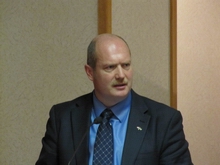Province to Step Up Civil Forfeiture
By 250 News
Monday, November 01, 2010 02:02 PM
 Prince George, B.C.- The Province of B.C. is looking at a new plan to step up civil forfeiture.
Prince George, B.C.- The Province of B.C. is looking at a new plan to step up civil forfeiture. Speaking to the anti gang summit in Prince George, Attorney General Mike deJong says the Province plans to be more aggressive through civil forfeiture to take the assets gained through crime. “I am a big fan of civil forfeiture because it hits organized crime where it hurts the most, in the pocket book, and the resources (cash) recovered, can be funneled back into more civil forfeiture to fund more policing. ”
He says the Province is looking at going to private lawyers to have them handle the forfeiture cases in their communities, and when the forfeiture is complete, the lawyer will be paid and the taxpayers get the benefits of the forfeiture. That will be rolled out as a pilot project in a number of communities soon.
Saying he is not entirely comfortable being in a room with so many experts who work on the front lines of gang activity, Attorney General Mike de Jong said he has noticed some key points. “I have noticed one thing, I have noticed in communities where two things are present, the societal outcomes tend to be better. Those two things are, education, and some prospect for economic promise. We know the single most important thing we can do, is to ensure they are educated. They make better choices, they’re healthier, the likelihood of the making a bad choice diminish dramatically and I believe that to be true. The other thing we need to give them in their homes as they go through that process, is that we need to give them hope that there is something out there to do. “
“The good news is, when we marshal the resources and concentrate efforts and activity we can actually have an impact.” He says when the pressure is on ,criminal activity moves to another area, but communities must be wary of using that as a measure of success.
He offered some random thoughts to the group;
“Yes there are more police officers dedicated in a coordinated way to deal with these matters, and yes that takes resources away from other places.” He says the challenge will be to decide on how those resources are used. “The (funding) pie is not getting any bigger.”
He says the best expense would be on early intervention for children, “We say children are the priority, but the numbers say something else. In the next two years health care spending will rise 2 billon dollars, imagine what we could do if even a fraction of that could be used for early intervention.”
He said the fact is, with health care costs growing, the biggest impediment to relalizing the objectives or to achieving change is the portion of the Provincial budhget which must go to fund health care.
Previous Story - Next Story
Return to Home










